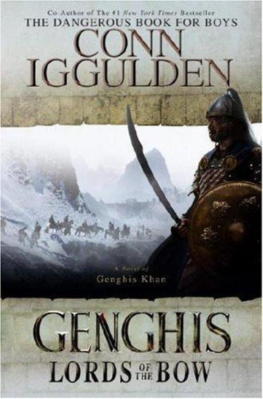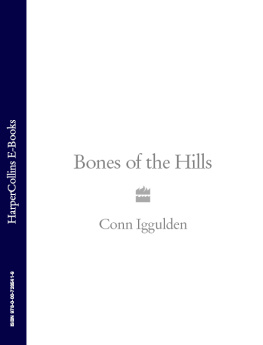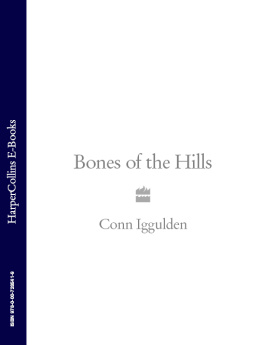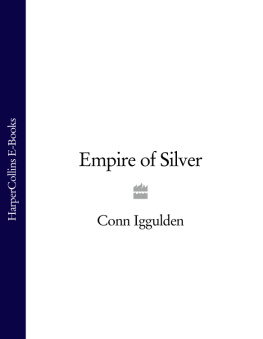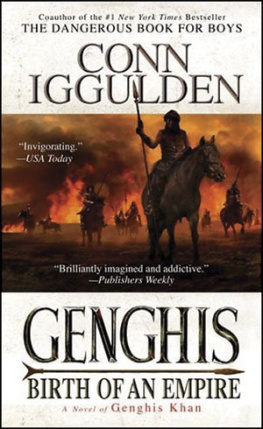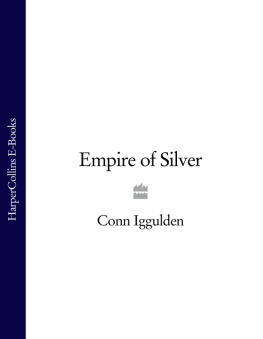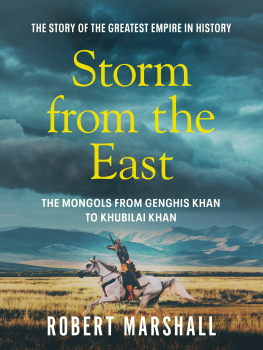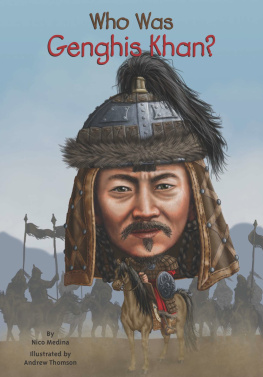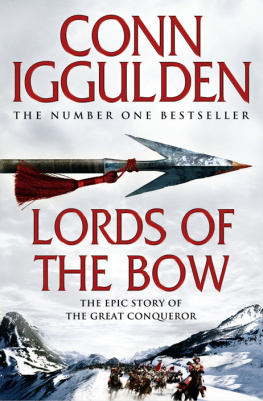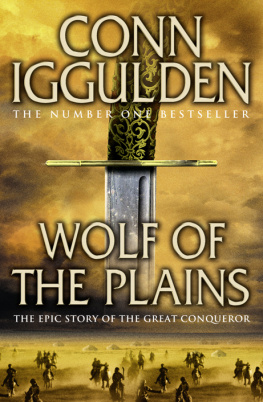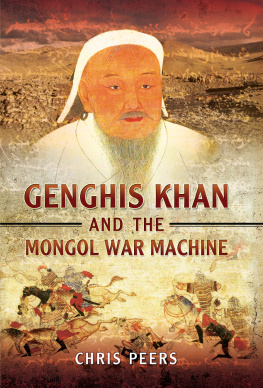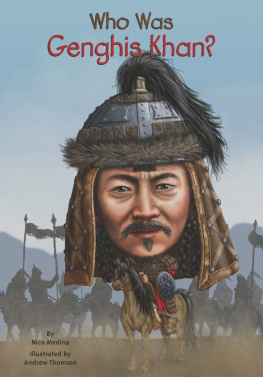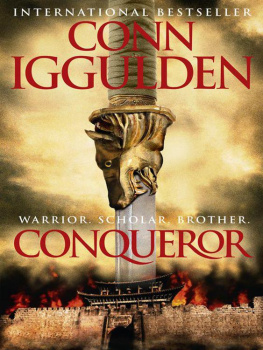Conn Iggulden - Genghis: Lords of the Bow (Genghis Khan: Conqueror Series #2)
Here you can read online Conn Iggulden - Genghis: Lords of the Bow (Genghis Khan: Conqueror Series #2) full text of the book (entire story) in english for free. Download pdf and epub, get meaning, cover and reviews about this ebook. year: 2008, publisher: Random House Publishing Group, genre: Detective and thriller. Description of the work, (preface) as well as reviews are available. Best literature library LitArk.com created for fans of good reading and offers a wide selection of genres:
Romance novel
Science fiction
Adventure
Detective
Science
History
Home and family
Prose
Art
Politics
Computer
Non-fiction
Religion
Business
Children
Humor
Choose a favorite category and find really read worthwhile books. Enjoy immersion in the world of imagination, feel the emotions of the characters or learn something new for yourself, make an fascinating discovery.
- Book:Genghis: Lords of the Bow (Genghis Khan: Conqueror Series #2)
- Author:
- Publisher:Random House Publishing Group
- Genre:
- Year:2008
- Rating:3 / 5
- Favourites:Add to favourites
- Your mark:
- 60
- 1
- 2
- 3
- 4
- 5
Genghis: Lords of the Bow (Genghis Khan: Conqueror Series #2) : summary, description and annotation
We offer to read an annotation, description, summary or preface (depends on what the author of the book "Genghis: Lords of the Bow (Genghis Khan: Conqueror Series #2) " wrote himself). If you haven't found the necessary information about the book — write in the comments, we will try to find it.
Genghis: Lords of the Bow (Genghis Khan: Conqueror Series #2) — read online for free the complete book (whole text) full work
Below is the text of the book, divided by pages. System saving the place of the last page read, allows you to conveniently read the book "Genghis: Lords of the Bow (Genghis Khan: Conqueror Series #2) " online for free, without having to search again every time where you left off. Put a bookmark, and you can go to the page where you finished reading at any time.
Font size:
Interval:
Bookmark:
Thanks to John Flicker, who kept Genghis on the right path and improved the battle at the pass.
BY CONN IGGULDEN
Emperor: The Gates of Rome
Emperor: The Death of Kings
Emperor: The Field of Swords
Emperor: The Gods of War
Genghis: Birth of an Empire
Genghis: Lords of the Bow
BY CONN IGGULDEN
AND HAL IGGULDEN
The Dangerous Book for Boys
ABOUT THE AUTHOR
CONN IGGULDEN is the author of Genghis: Birth of an Empire, the first novel in the series, as well as the Emperor novels, which chronicle the life of Julius Caesar: Emperor: The Gates of Rome; Emperor: The Death of Kings; Emperor: The Field of Swords; and Emperor: The Gods of War, all of which are available in paperback from Dell. He is also the author of the bestselling nonfiction work The Dangerous Book for Boys. He lives with his wife and three children in Hertfordshire, England.
HISTORICAL NOTE
Nature has left this tincture in the blood,
That all men would be tyrants if they could.
DANIEL DEFOE
The birthdate of Genghis can only ever be estimated. Given the nomadic nature of the Mongol tribes, the year and location of his birth were never marked. In addition, small tribes would record the years in terms of local events, making it hard to match to calendars of the day. It is only when Genghis comes into contact with the larger world that the dates are known with any certainty. He invaded the Xi Xia region south of the Gobi in 1206 A.D. and was proclaimed khan of all the tribes in the same year. In the Chinese calendars, that was the year of Fire and of the Tiger, at the end of the Taihe era. He may have been as young as twenty-five or as old as thirty-eight when he united his people. I have not dwelled on the years of war and alliances as he slowly brought the great tribes together under his command. Interesting as that was, his story always had a wider scope. I recommend The Secret History of the Mongols, translated by Arthur Waley, for anyone wishing to know more of that period.
The Naiman alliance was the last major coalition to resist being swept up into the new nation. The khan of the Naimans did climb Mount Nakhu, moving further and further up the slopes as the army of Genghis advanced. Genghis offered to spare his bondsmen, but they refused and he had them killed to the last man. The rest of the warriors and families were absorbed into his own forces.
Kokchu was a powerful shaman, also known as Teb-Tenggeri. Little is known of exactly how he became influential. Both Hoelun and Borte complained to Genghis about him at various points. His ability to influence Genghis became a great source of concern for those around the khan. Genghis himself believed in a single sky father: deism supported by the spirit world of shamanism. Kokchu remains something of an enigma. One law of the tribes was that it was forbidden to shed royal blood or that of holy men. I have not yet finished telling his story.
As the tribes gathered to Genghis's call, the khan of the Uighurs wrote a declaration of loyalty almost exactly as I have it here. However, the incident of Khasar being beaten and Temuge forced to kneel involved sons of the Khongkhotan clan rather than the Woyela.
Genghis did flood the plain of the Xi Xia and was forced to retreat before the rising waters. Although it must have been embarrassing, the destruction of the crops brought the king to the negotiating table and eventually won a vassal for the Mongol people. It would not have been Genghis's first encounter with the idea of paying tribute. Mongol tribes were known to negotiate in this way, though never on this scale. It is interesting to consider what Genghis must have made of the riches of the Xi Xia and, later, the emperor's own city. He had no use for personal possessions beyond those he could carry on his horse. Tribute would have impressed the tribes and signaled his dominance, but otherwise had very little practical use.
The outcome for the Xi Xia might have been different if Prince Wei of the Chin empire had answered the call for aid. His message (in translation) was: It is to our advantage when our enemies attack one another. Wherein lies the danger to us?
When Genghis went round the Great Wall of China, he did so only by accident. His path to Yenking through Xi Xia lands neatly circumvented the wall. However, it is important to understand that the wall was a solid obstacle only in the mountains around Yenkinglater known as Peking, then Beijing today. In other places, the wall was broken, or no more than a rampart of earth with an occasional guard post. In later centuries, the wall was joined into one continuous barrier to invasion.
It is worth noting that the Western pronunciation of Chinese place-names is always an approximation, using an alien alphabet to create the same sound. Thus, Xi Xia is sometimes rendered as Tsi-Tsia, or Hsi-Hsia, and Chin is sometimes written as Jin or even Kin. Sung is written as Song in some texts. I have managed to find twenty-one spellings of Genghis, from the exotic Gentchiscan and Tchen-Kis to the more prosaic Jingis, Chinggis, Jengiz, and Gengis. The Mongolian word ordo or ordu means camp or general headquarters. From this we derive the word horde. Some dictionaries give the word shaman as a word of Mongolian origin, and the Gurkhas of Nepal could well derive their name from Gurkhan, or khan of khans.
Genghis had four legitimate sons. As with all Mongol names, there are differences in spelling, much as the word Shakespeare is occasionally written as Shaksper, or Boadicea as Boudicca. Jochi is sometimes seen as Juji, Chagatai as Jagatai, Ogedai as Ogdai. His last son was Tolui, sometimes written as Tule.
As well as the Xi Xia princess, Genghis often accepted wives from his beaten enemies. One of his later decrees made all Mongol children legitimate, though the ruling did not seem to affect the right to inherit among his own sons.
Walled cities were always a problem for Genghis. At the time of his attack on Yenking, that city was surrounded by fortress villages containing granaries and an arsenal. There were moats around the city walls and the walls themselves were almost fifty feet thick at the base, rising as high. The city had thirteen well-constructed gates and what is still the longest canal in the world, stretching more than a thousand miles south and east to Hangzhou. Most of the world's capital cities have their beginnings on the shores of a great river. Beijing was built around three great lakesBeihei to the north, Zhonghai (or Songhai) in the center, and Nanhai to the south. It may well be the oldest continuously occupied human settlement, as evidence of inhabitants has been found from nearly half a million years agoPeking Man, as he is sometimes known.
At the time of Genghis's attack through the pass of the Badger's Mouth, Yenking had undergone a period of growth that resulted in walls five miles in circumference and a population of a quarter of a million households, or approximately a million people. It is possible to imagine as many as half a million more who would not show up on any official count. Even then, the famous Forbidden City within the walls and the emperor's Summer Palace (destroyed by British and French soldiers in 1860) had not yet been built. Today, the city has a population of approximately fifteen million people, and it is possible to drive through the pass that was once host to one of the bloodiest battles in history. That too is a known date: 1211 A.D. Genghis had been leader of his people for five years at that point. He was in the prime of his physical strength and fought with his men. It is unlikely that he was much older than forty, but he may have been as young as thirty, as I have written here.
Next pageFont size:
Interval:
Bookmark:
Similar books «Genghis: Lords of the Bow (Genghis Khan: Conqueror Series #2) »
Look at similar books to Genghis: Lords of the Bow (Genghis Khan: Conqueror Series #2) . We have selected literature similar in name and meaning in the hope of providing readers with more options to find new, interesting, not yet read works.
Discussion, reviews of the book Genghis: Lords of the Bow (Genghis Khan: Conqueror Series #2) and just readers' own opinions. Leave your comments, write what you think about the work, its meaning or the main characters. Specify what exactly you liked and what you didn't like, and why you think so.

